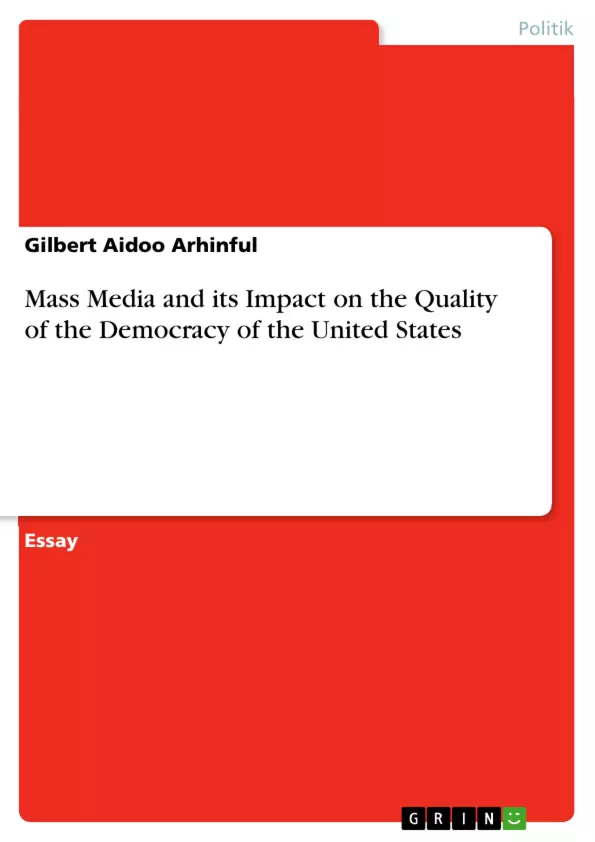This paper will help ascertain the major impacts of the United States’ mass media on the quality of its long democratic tradition. The paper discusses briefly, the concept and components of a democracy, the generic role of the mass media and effects on the democratic process and explores the role and impacts of the mass media in the United States on its democratic processes. It has widely been acknowledged that there is a reciprocal relationship between free and independent mass media and the quality of a multi-party democratic system.
Inhaltsverzeichnis
- INTRODUCTION
- CONCEPTUALIZATION OF DEMOCRACY
- THE MASS MEDIA AND DEMOCRATIC GOVERNANCE
- THE MASS MEDIA AND QUALITY OF DEMOCRACY IN THE UNITED STATES
- CHALLENGES IN THE UNITED STATES MEDIA LANDSCAPE
Zielsetzung und Themenschwerpunkte
Dieser Text untersucht die Rolle der Massenmedien in der Stärkung und Aufrechterhaltung der Qualität des demokratischen Systems der Vereinigten Staaten. Die Analyse beleuchtet den wechselseitigen Einfluss zwischen freien und unabhängigen Medien und der Funktionsfähigkeit einer Mehrparteiendemokratie, wobei die Besonderheiten des amerikanischen Mediensystems betrachtet werden.
- Die Bedeutung freier und unabhängiger Massenmedien für eine funktionierende Demokratie
- Die Rolle der Massenmedien als Informationsquelle, Kontrollinstanz und Forum für öffentliche Debatten
- Die Herausforderungen für die Medienlandschaft der Vereinigten Staaten und deren Auswirkungen auf die Qualität der Demokratie
- Die Beziehung zwischen demokratischer Partizipation, politischer Freiheit und Medienstruktur
- Die Auswirkungen der Massenmedien auf die Politikgestaltung und die öffentliche Meinungsbildung
Zusammenfassung der Kapitel
- INTRODUCTION: Der Text stellt die Relevanz freier und unabhängiger Massenmedien für eine funktionierende Demokratie dar und hebt deren Rolle als Informationsquelle und Plattform für den Austausch von Ideen hervor.
- CONCEPTUALIZATION OF DEMOCRACY: Dieses Kapitel beleuchtet verschiedene Definitionen und Konzepte der Demokratie, einschließlich ihrer institutionellen, prozeduralen und wertebezogenen Elemente. Es werden verschiedene Modelle der Demokratie diskutiert, darunter der Elitismus, der liberale Pluralismus und der Republikanismus.
- THE MASS MEDIA AND DEMOCRATIC GOVERNANCE: Dieses Kapitel befasst sich mit der Rolle der Massenmedien in demokratischen Systemen. Es werden die wichtigsten Funktionen der Medien in Bezug auf die Informationsvermittlung, die Kontrolle der Regierung und die Förderung der öffentlichen Debatte erläutert.
Schlüsselwörter
Massenmedien, Demokratie, Vereinigte Staaten, freie Medien, unabhängige Medien, Informationsvermittlung, Meinungsbildung, politische Partizipation, Kontrollfunktion, Medienlandschaft, Herausforderungen.
Häufig gestellte Fragen
Welche Rolle spielen Massenmedien in der US-Demokratie?
Sie fungieren als "vierte Gewalt", die die Regierung kontrolliert, Bürger informiert und als Forum für öffentliche Debatten dient.
Was versteht man unter Medienunabhängigkeit?
Dass Medien frei von staatlicher Zensur und übermäßigem wirtschaftlichem Druck berichten können, um eine objektive Meinungsbildung zu ermöglichen.
Welche Herausforderungen gibt es in der US-Medienlandschaft?
Dazu gehören die zunehmende Polarisierung, die Konzentration von Medienbesitz in wenigen Konzernen und die Verbreitung von Desinformation.
Wie beeinflussen Medien die politische Partizipation?
Indem sie über politische Prozesse aufklären und Themen setzen (Agenda Setting), motivieren sie Bürger zur Teilnahme an Wahlen und Debatten.
Gibt es einen Zusammenhang zwischen Medien und Regierungsführung?
Ja, freie Medien erhöhen die Transparenz und Rechenschaftspflicht der Regierung, was die Qualität der demokratischen Governance verbessert.
- Quote paper
- Gilbert Aidoo Arhinful (Author), 2017, Mass Media and its Impact on the Quality of the Democracy of the United States, Munich, GRIN Verlag, https://www.grin.com/document/1129505



